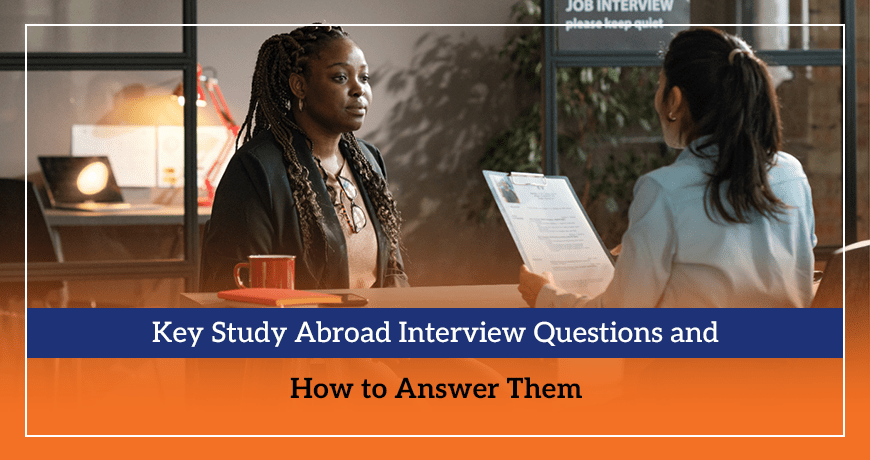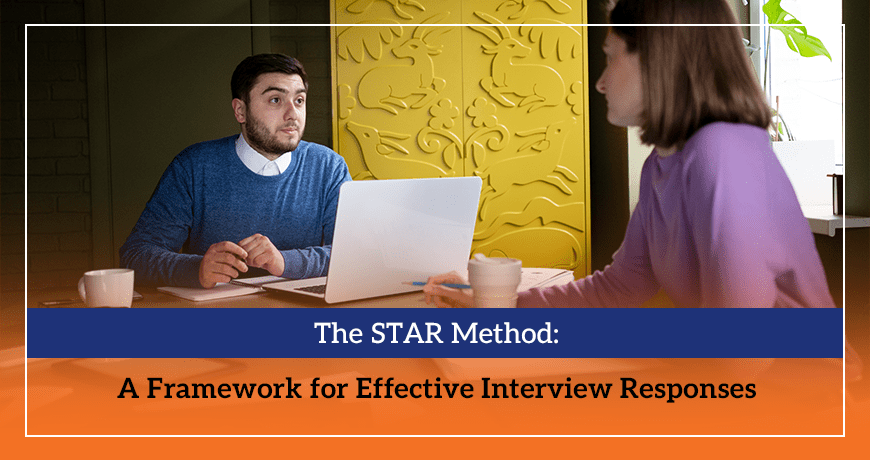So, you've got your dream study abroad program in sight? That's fantastic! But remember, with increasing competition, your application needs that extra edge. And that's where the interview comes in.
A well-executed interview can be a game-changer. It can help you showcase your unique qualities and convince the admissions committee that you fit their program perfectly. Let’s dive deeper and learn about study abroad interview questions that you may encounter.
What to Expect in a Study Abroad Interview
When you sit down for a study abroad interview, interviewers typically focus on several key areas:
Motivation:
- Why study abroad? Your answer should go beyond a generic desire for travel. Highlight specific academic or personal goals that can be achieved through this experience. For example, you might want to delve deeper into a particular subject matter, improve your language skills, or gain cross-cultural competence.
- Alignment with academic and career goals: Explain how studying abroad fits your long-term plans. Will it provide specialized knowledge or skills to make you a more competitive job candidate? How will it enhance your academic experience and prepare you for future challenges?
Adaptability:
- Cultural sensitivity: Demonstrate your understanding of cultural differences and willingness to embrace new perspectives. Share any experiences you've had interacting with people from diverse backgrounds.
- Problem-solving skills: Accentuate your capability to think critically and show them you can solve challenges. Discuss any instances where you've had to adapt to unexpected situations or overcome obstacles.
- Resilience: Show you can bounce back from setbacks and maintain a positive attitude. Share a personal anecdote about a time when you faced adversity and how you persevered.
Academic Preparation:
- Research: Demonstrate your knowledge of the program, the host institution, and the academic requirements. Discuss specific courses or research opportunities that interest you.
- Time management: Explain how you plan to balance academic work, extracurricular activities, and social life abroad. Highlight any time management strategies you've used successfully in the past.
To prepare for these types of questions, you might consider practising your answers to the following:
- Why do you want to study abroad?
- How does studying abroad align with your academic and career goals?
- How will you handle cultural differences and challenges?

Key Study Abroad Interview Questions and How to Answer Them
Here are some common study-abroad interview questions and tips on how to answer them effectively:
1. Tell me about yourself.
- Weak Answer: "I'm [Name], and I'm a [Year] student at [University]."
- Strong Answer: "I’m [Name], an impassioned [Major] student at [University]. My academic journey has been enriched by [specific coursework or research experience]. Beyond the classroom, I've actively engaged in [relevant extracurricular activities or volunteer work]. I'm particularly drawn to [specific interest or skill], and I'm excited about the opportunity to [specific goal, e.g., improve language skills, study abroad, pursue research]."
2. Why did you choose this country/program?
- Weak Answer: "It seemed interesting."
- Strong Answer: "[Country] offers a unique blend of [specific cultural or historical aspect] that aligns perfectly with my academic interests in [field of study]. The program's emphasis on [specific course or program feature] will allow me to delve deeper into [specific topic or skill]. I'm particularly drawn to the opportunity to [specific experience, e.g., study abroad, internship, research project]."
3. What do you hope to achieve during your time abroad?
- Weak Answer: "I want to have fun."
- Strong Answer: "I aim to immerse myself in the local culture, enhance my language proficiency, and gain valuable international experience. I hope to [specific goal, e.g., conduct research, volunteer, or intern]. Ultimately, I believe this experience will broaden my perspective, strengthen my intercultural competence, and prepare me for future academic and professional challenges."
4. How will you handle cultural differences and challenges?
- Weak Answer: "I'll figure it out."
- Strong Answer: "I feel that cultural differences are great opportunities for personal growth and learning. I'm open-minded, adaptable, and eager to embrace new perspectives and experiences. By actively seeking out cultural exchange opportunities and respecting local customs, I'm confident in my ability to navigate any challenges that may arise."
5. What are your strengths and weaknesses?
- Weak Answer: "I'm perfect."
- Strong Answer: "One of my greatest strengths is my ability to [Strength, e.g., problem-solve, communicate effectively, or think critically]. I'm also a highly motivated and dedicated individual. However, I sometimes struggle with [Weaknesses, e.g., time management or public speaking]. To address this, I've implemented [specific strategy, e.g., using a planner, practising public speaking, or seeking feedback]."

The STAR Method: A Framework for Effective Interview Responses
The STAR method is a proven tool for arranging your responses to behavioural interview questions. This method lets you present your experiences clearly, concisely, and compellingly. Here's a breakdown of the STAR method:
- Situation: Narrate the specific situation or challenge you faced earlier.
- Task: Highlight the tasks or goals you had to accomplish.
- Action: Detail out the specific actions you took to manage the situation.
- Result: Highlight the positive outcome or result of your actions.
Example 1: Adapting to a New Culture
- Situation: I had the opportunity to study abroad in a country with a significantly different culture from my own.
- Task: I needed to quickly adapt to new customs, social norms, and communication styles.
- Action: I actively sought opportunities to interact with locals, joined cultural exchange programs, and took language classes. I also consciously tried to be open-minded and respectful of different perspectives.
- Result: Through my efforts, I successfully integrated into the local community, built strong friendships, and gained a deeper understanding of the host culture.
Example 2: Solving a Problem
- Situation: I encountered a significant academic challenge during my study abroad program.
- Task: I needed to develop a strong research paper within a tight deadline.
- Action: I broke down the task into smaller, manageable steps, prioritized my time effectively, and sought guidance from my professors and peers. I also utilized the university's resources, such as the library and writing centre.
- Result: I completed the research paper to a high standard and received positive feedback from my professor.
Questions About Qualifications and Preparedness
Here are some common questions about qualifications and preparedness, along with tips on how to answer them:
1. How does this experience relate to your studies?
This question lets you connect your study abroad experience to your academic goals.
Strong Answer: "My [major] studies have equipped me with a strong foundation in [relevant skills or knowledge]. Studying abroad will allow me to apply this knowledge to real-world situations, particularly in [specific area of interest]. For example, I'm excited to explore [specific topic] in [host country], which aligns perfectly with my research interests."
2. Have you travelled or studied abroad before?
If you have prior international experience, highlight the skills and knowledge you gained. If not, focus on your adaptability and willingness to learn.
Strong Answer: "While I haven't had the chance to study abroad earlier, I have travelled to [country] and [country]. These experiences have helped me to be exposed to different cultures, languages, and perspectives. I'm confident in my ability to adapt to new environments and overcome challenges."
3. Do you understand the visa process and financial requirements?
Demonstrate your knowledge of the logistics involved in studying abroad.
Strong Answer: "I've thoroughly researched the visa requirements for [host country] and have already started the application process. I've also developed a detailed tuition, housing, and living expenses budget. I'm confident I can manage my finances effectively and comply with all immigration regulations."

Questions About Long-Term Goals and Commitment
Here are some common questions about long-term goals and commitment, along with tips on how to answer them:
1. Where do you see yourself after this program?
This question lets you demonstrate how your study abroad experience fits your long-term plans.
Strong Answer: "After completing this program, I decided to pursue a [specific career path] in [industry]. The skills and knowledge I gain from studying abroad, such as [specific skill, e.g., intercultural communication, language proficiency, or research methods], will be invaluable in achieving my career goals. I hope to use these skills to [specific goal, e.g., work for an international organization, start my own business, or pursue further academic studies]."
2. Do you plan to return to your home country?
Be honest about your long-term plans, but also emphasize the benefits of studying abroad and the skills you'll gain.
Strong Answer: "While I plan to return to my home country after completing this program, I'm open to future opportunities. Studying abroad will equip me with a global perspective, strong intercultural communication skills, and a deeper understanding of different cultures. These skills will be valuable assets, regardless of where my career takes me."
Preparing for Curveball Questions
It's always a good idea to be prepared for the unexpected. A "curveball" question can sometimes throw off even the most confident interviewee. Here are some tips on how to handle these types of questions:
- Stay Calm: The first step is to remain calm and collected. Take a deep breath and gather your thoughts.
- Take a Moment: Don't rush into an answer. Pause for a moment to consider your response.
- Draw on Past Experiences: Reflect on past challenges and how you overcame them. This will help you formulate a thoughtful and relevant answer.
- Focus on Problem-Solving Skills: Highlight your ability to think critically, adapt to change, and find solutions.
- Be Honest and Transparent: If you don't have a specific answer, be honest and explain your approach to problem-solving.
Example:
Question: "What would you do if things don't go as planned abroad?"
Strong Answer: "I understand that unexpected challenges can arise when studying abroad. If I encounter a difficult situation, I'll approach it with a problem-solving mindset. I'll first assess the situation, identify the root cause, and develop a plan to address the issue. I'll seek advice from my program advisor, host family, or other trusted individuals if needed. I can overcome obstacles and maximise my study abroad experience by staying positive and proactive.
Practical Interview Tips for Success
To ace your study abroad interview, keep these practical tips in mind:
Thorough Research:
- Destination Deep Dive: Immerse yourself in the country's culture, customs, and current events. Understand the nuances of the local lifestyle and etiquette.
- Program Particulars: Delve into the program's curriculum, faculty expertise, and student life. Familiarize yourself with the academic rigour, extracurricular opportunities, and support services available.
- Visa Vigilance: Be well-versed in visa regulations, deadlines, and required documentation. Understand the specific requirements for your nationality and the host country.
Practice Makes Perfect:
- Mock Interview Mastery: Rehearse common questions with a friend or mentor. Simulate the interview environment as closely as possible, including timing and pressure.
- Self-Assessment: Record yourself answering questions to analyze your body language, tone of voice, and eye contact. Find out areas for improvement and rectify your delivery.
- Time Management: Practice answering questions within a specific time limit. This will help you develop concise and effective responses.
Presentation Prowess:
- Professional Attire: Choose attire that is appropriate for a formal setting. Dress conservatively and avoid overly casual or revealing clothing.
- Punctuality: Make sure to arrive on time, or even a few minutes early, for your interview. Punctuality demonstrates your respect for others' time and your reliability.
- Posture and Presence: Don’t forget to sit up straight and maintain eye contact. Good posture exudes confidence and engagement.
- Clear and Confident Communication: Enunciate your words clearly and speak at a moderate pace. Project your voice and speak with conviction.
Conclusion
Remember, a well-prepared interview is your key to unlocking a world of opportunities. By understanding the common study abroad interview questions interviewers look for and practising your responses, you can confidently navigate the interview process.
As you prepare, stay true to yourself. Your authenticity and passion for your goals will shine through. Be thoughtful in your answers, drawing on your experiences and aspirations.
With the right preparation and a genuine enthusiasm for the experience, you're well on your way to a successful study abroad adventure. Good luck!